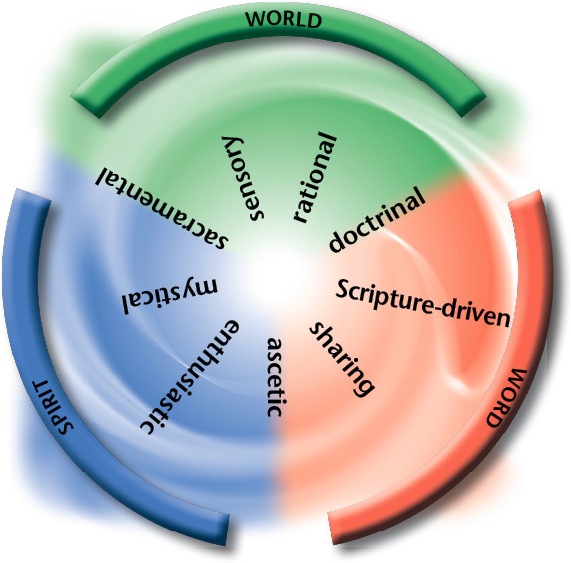YOUR CART

Principles of Growth
God grows organisms. We tend them by removing barriers to health and growth.
Lynn Chetcutti, NCD’s previous National Partner in the UK, on church health and growth.
Trinitarian Compass


All of the books in the NCD Discipleship Resources series are based on the Trinitarian Compass, which is a unique feature of the NCD paradigm. It uses the dynamics of the colors of light (Red/Green/Blue scheme) as a way of illustrating the practical relevance of the Christian doctrine of the Trinity for the daily challenges of believers: In order to produce pure white light, the colors red, green, and blue must be displayed simultaneously. The color green is related to God’s revelation in creation; the color red, to God’s revelation in Jesus Christ; and the color blue, to God’s revelation in the Holy Spirit. Each of these three revelations corresponds to basic dimensions of life.
The most important dynamics of the Trinitarian Compass, according to its developer, Christian A. Schwarz, are:
- In order to reflect God’s “light” as fully as possible, it is essential that a balance of all three colors is pursued.
- The terms used in any given adaptation of the Trinitarian Compass always aim at representing a complete picture of the topic under consideration, divided into different segments of equal importance.
- The location of these segments in the Trinitarian Compass is more important than the actual terms used for describing them.
- While at an individual level it may be acceptable to be one-sided in terms of one’s favorite colors, at a corporate level the goal of balance must not be abandoned.
- The pursued equilibrium must manifest itself as a “radical balance”, i.e. characterized by a strong presence of all the three colors, not by trying to achieve balance through reducing the strength of a given area.
- For every person, it is beneficial to precisely know his or her respective color blend related to a specific topic. It explains both their strengths and their weaknesses. It also explains which kind of people they should connect with in order to complement for their own imbalances.
- It is always a challenge to learn from the opposite position within the compass, but this is exactly the kind of learning that helps people move to maturity.
- By striving to represent all three colors, the dynamics of “theosis” are activated: a transformative process with the goal of union with God. This very process activates what NCD refers to as “all by itself” growth.
The 8 Quality Characteristics
During the original research, NCD discovered that there are eight, equally important characteristics that differentiate healthy, growing churches from those plateaued or in decline.
Empowering Leadership
Are the leaders focused on equipping other Christians to lead and serve?
Ephesians 4:11-13
Gift-based Ministry
Are persons in the congregation encouraged to know and effectively use their gifts?
1 Peter 4:10
Passionate Spirituality
Are the spiritual connections with God of those in the congregation characterized by prayer, enthusiasm, generosity and boldness?
Romans 12:11-12
Effective Structures
Is the congregation committed to continually adapting its structures to support ongoing healthy growth?
Inspiring Worship
Are people encountering God in life-transforming ways during the worship services?
1 Thessalonians 5:16-19
Holistic Small Groups
Are the smaller groups consistently growing in their worship of God, their nurture of members and their mission focus?
Hebrews 10:24-25 and Acts 2:46-47
Need-oriented Evangelism
Is the outreach of the church driven by a genuine desire to meet people at their point of need and offer them Christ?
Loving Relationships
are the relationships in the congregation characterized by genuine love, joyfulness and encouragement shown in both word and deed?
John 13:34-35
For more information on NCD globally, click here.
Bill Bickle, through Fordelm Inc., is NCD’s Canadian National Partner
A sister resource for non-church faith-based organizations, Organic Quality Management (OQM), leverages all the principles, tools and processes of NCD.

